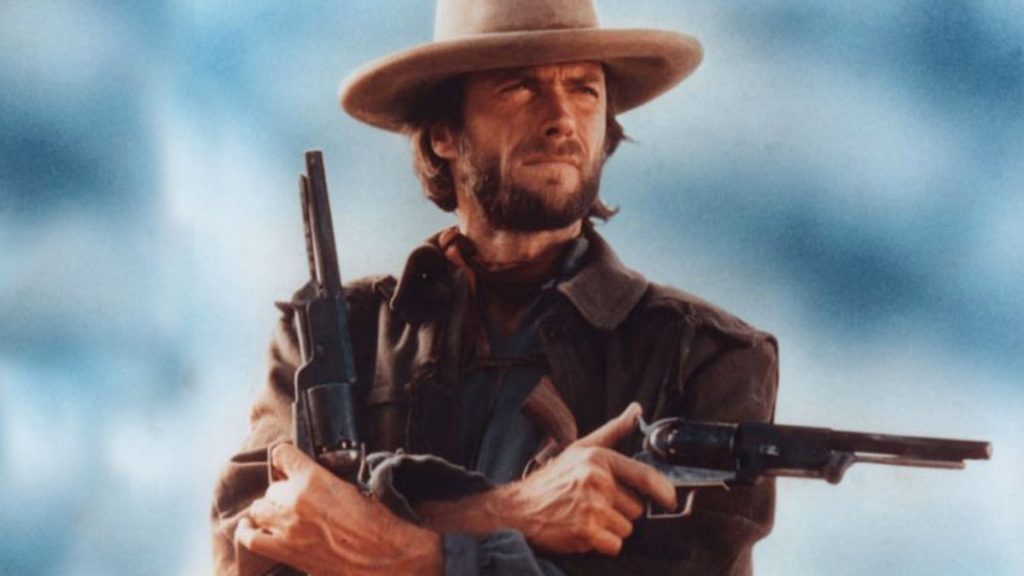THE OUTLAW JOSEY WALES (1976)

“Are you gonna pull those pistols or whistle Dixie?” – Josey Wales
Returning again to the Wild West for the first time since High Plains Drifter, The Outlaw Josey Wales is one of the most ambitious (and one of the most effective) projects in which Eastwood had yet been involved. A meditation on loss and regret, and the casualties of war, both physically and spiritually.
Clint Eastwood wasn’t originally supposed to direct The Outlaw Josey Wales. Those duties were originally assigned to Philip Kaufman, who helped adapt the novel along with Sonia Chernus and Michael Cimino (who had written and directed Thunderbolt and Lightfoot). But Eastwood (who had invested some of his personal funds into obtaining the film rights to the original novel) had strong differences of opinion to Kaufman’s style of direction and even occasionally undermined some of Kaufman’s choices on set. The two of them also had fundamental interpretive differences over foundational and thematic elements of the narrative.
Eventually, Eastwood fired Kaufman (conveniently following all of the primary pre-production work Kaufman had done) and persuaded Warner Bros. to support his decision when the Directors Guild tried to challenge the termination. Eastwood himself took up directorial duties, but the scandal led to a new stipulation in the DGA (colloquially called “The Eastwood Rule”) that would prevent major stars of projects from pressuring studios to fire the project’s director and assign them the job. Despite the tumultuous production (and the potentially poor marks on Eastwood’s character), the film is a fantastic work: deeply affecting, thematically rich, and ultimately unforgettable.
Narratively, The Outlaw Josey Wales is also episodic in structure (following the pattern of Eastwood’s recent films Thunderbolt and Lightfoot and The Eiger Sanction). It follows the Civil-War era struggles of the titular character Josey Wales (Eastwood), who, after witnessing the brutal murder of his wife and son at the hand of Union renegades called “Redlegs”, joins a band of outlaws seeking to combat the Union army guerrilla style. After the war ends, the outlaws are offered pardon if they surrender peacefully, and all but Wales accept the offer. Unfortunately, the offer was a trap and the entire group is slaughtered. Except, of course, for Josey Wales. What follows is a series of adventures in which Wales, on the run from the Redlegs, collects and begins to lead a group of various wanderers and restless travelers who seek only peace and dignity in the Civil War’s aftermath.
Thematically, this is one of Eastwood’s most ambitious films yet. Eastwood’s presence in the western genre has always prompted a revision to the traditional “white-hat” vision of cowboys. “Good” and “bad” are not simple designations in any of Eastwood’s westerns, whether the Leone trilogy or his first directorial western, High Plains Drifter. But those films all operated in archetypes which they subverted to lesser and greater effect depending on the film, and although the Leone trilogy especially offers a lot in the way of substance, The Outlaw Josey Wales feels like the first of Eastwood’s westerns that’s attempting to seriously wrestle with the soul of war and its spiritual losses.
This is not to say that the film contains very much overt religious imagery or language, but that the tone of the film is introspective: interested far less in sequences of thrill and spectacle than of human connections and the disintegration of a peaceful landscape. There are thrilling sequences, and more than a handful of boisterous shoot-outs, but the meat of this material is in the reflections voiced by the characters before and after those more bombastic moments. This tone is also struck most directly when Josey Wales, weeping over the grave of his wife and son, quotes the biblical passage, “The Lord gives and the Lord takes away.” The film is not making a spiritual statement so much as exploring a spiritual landscape, and it’s stronger for it.
The supporting cast, both in performers and characters, is solid and colorful. From the comical philosopher-Indian Lone Watie (played by Chief Dan George), to the stoic and hardened Fletcher (John Vernon), and then to the lovely but strong pioneer Laura Lee (played by Sondra Locke, in what would begin a six-film professional and 14-year personal relationship with Eastwood). Various philosophies and poignant reflections are given to and delivered by each of the film’s supporting cast in turn, including an ill-fated youth, a cantankerous old woman, and a murderous Comanche chief, with whom Josey Wales has one of the most powerful and profound exchanges of the film. The result is a kaleidoscope of themes, perspectives, and possible conclusions, which would be confusing in a film of lesser focus or direction but shines brightly under Eastwood’s hand.
This also represents some of Eastwood’s finest work as an actor thus far in his career. Josey Wales as a character is melancholic and reclusive, which Eastwood has displayed countless times before. But unlike the “man with no name” or the “high plains drifter”, Josey Wales has not shifted into overt bitterness and bile. He is a character of deeply abiding compassion and, although deadly to any enemy who dares to cross him, he is a man of profound sympathy and discretion. Eastwood navigates this nuance with notable ease and delivers one of his most compelling characters as a result.
While The Outlaw Josey Wales may have been a somewhat controversial production, the final product is remarkably effective and confirms Eastwood’s standing as a storyteller of substance and merit. Fans of his grittier and more brutal westerns may find themselves somewhat disarmed by the quieter moments and more introspective tone in the film, perhaps even skirting to the very edge of boredom. But there is an undeniable maturity to this film that is worth casting aside expectations to experience.
 Reed Lackey is based in Los Angeles, where he writes and podcasts about film and faith. His primary work is featured on the More Than One Lesson website and podcast, as well as his primary podcast, The Fear of God (which examines the intersection between Christianity and the horror genre). Follow him on Twitter or on Facebook to receive updates on his reviews and editorials.
Reed Lackey is based in Los Angeles, where he writes and podcasts about film and faith. His primary work is featured on the More Than One Lesson website and podcast, as well as his primary podcast, The Fear of God (which examines the intersection between Christianity and the horror genre). Follow him on Twitter or on Facebook to receive updates on his reviews and editorials.

